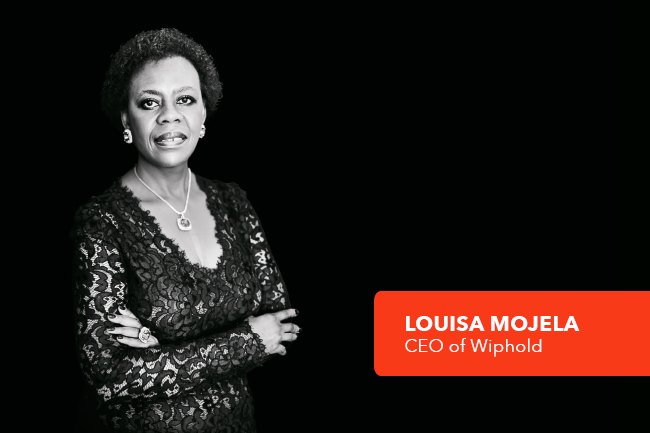Despite programmes targeting BEE, transformation, knowledge, skills development and corporate social responsibility, Louisa Mojela, one of the founders and CEO of Wiphold, believes that empowerment has regressed in recent years, ‘particularly when compared to the number of women-owned empowerment companies that were established post the new democratic dispensation’.
This statement is especially poignant because Mojela and her Wiphold co-founders pioneered the first all-black women-owned investment companies in the country before BEE legislation or directives were contem-plated. Not only a momentous achievement, it was a brave step given the nature of the business, which holds investment portfolios focusing on key strategic sectors of the economy, particularly those that historically excluded disenfranchised South Africans, especially black women who would never have dreamt of venturing into areas such as mining, agriculture, cement manufacturing and financial services.
Through two broad-based trusts – the Wiphold Investment Trust and the Wiphold NGO Trust – the organisation represents more than 200 000 women (and children) beneficiaries whose 33.6% stakeholding in the business gives them direct ownership in the company. It does this through a uniquely structured database that ensures all individuals are registered, including the most current names, addresses and bank account details, to ensure adherence to Financial Intelligence Centre Act requirements, and that dividends go to the right recipients to ensure accountability.
The Wiphold Investment Trust was established in 1997 when a public offer inviting women to become shareholders took place. The trust was structured in such a way that the women would become permanent shareholders of Wiphold.
Equally, the establishment of the NGO Trust was facilitated by Wiphold in an effort to bolster the economic ownership of women in the company. The trust represents those programmes and projects whose primary focus is pertinent to the advancement and development of women and children.
To date, some ZAR769 million has been distributed to shareholders, of which ZAR254 million has gone to beneficiaries of the two trusts. Mojela believes it has been able to do this by not deviating from its core mandate, namely dedication to the empowerment of women and value creation through the process of wealth mobilisation.
‘We have an excellent track record given our management team, which has experience in deal structuring and corporate finance, as well as the ability to source good investment opportunities with high growth and good divided yield. Our focus on acquiring and building strategic relationships and investments in key economic sectors has been important.’
Wiphold’s current portfolio includes Old Mutual, and its latest transactions were with Sasfin and Bluespec, Mamba Cement, Sasol Mining, Hans Merensky Holdings and Distell – all of which Mojela says ‘have the ability to deliver strong returns over time with excellence in quality of management, an ability to generate cash and a commitment to transform and redress the imbalances of the past’.
Knowing just how impactful Wiphold’s investments are is the reason why Mojela is disappointed in the slowing progression of empowerment, especially of women in rural, urban and peri-urban areas. No country can develop at the exclusion of developing and empowering women, she says.
‘Challenges such as a recession, preceded by a sluggish economy are not ignored but it remains a fair observation that there has been some reluctance from the private sector to advance new BEE transactions with the excuse of glaring lack of accountability and corporate governance within state-owned enterprises, and alleged corruption by politicians.
‘It must also be noted that although portions of the private sector have done BEE transactions, over time such BEE partners usually exit to realise their investment. The current state of the political landscape, which resulted in the firing of two finance ministers within a short period of time, has also resulted in a lack of business confidence and the consequential downgrades in our global credit status. All this has served to limit empowerment opportunities, particularly those of women.
‘Increasing the participation of women in economic ownership of the resources of this country is a challenge beyond Wiphold alone. It requires the commitment of government, private sector and genuine black entrepreneurs. Corruption and fronting by some black businesses are detrimental to the goal of achieving successful economic ownership by disenfranchised South Africans,’ says Mojela.
Giving more insight into the thinking behind this, consider that despite Wiphold’s ownership/management and female employees comprising 70%, Mojela feels that it is really just a ‘moderate’ percentage in terms of how many black South Africans are still out of the active economic space.
‘For women, particularly the young, to reach self-actualisation at this point, requires a dogged determination that will enable them to aim higher and achieve what we have left undone,’ says Mojela. ‘They must transcend us.’



